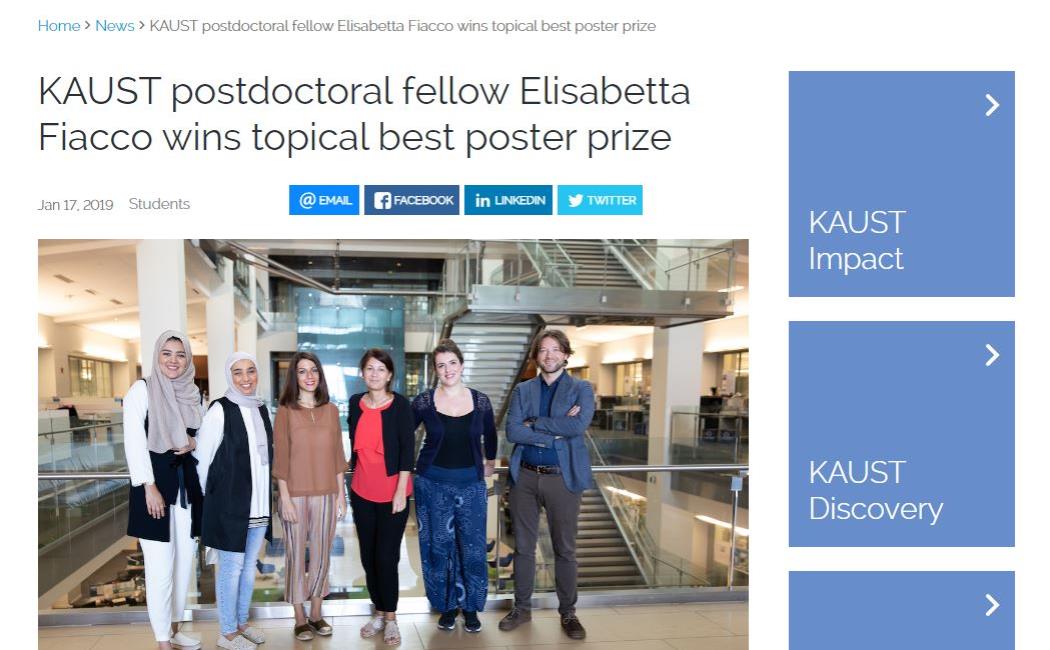
31 January, 2017
By David Murphy, KAUST News
Elisabetta Fiacco, a KAUST postdoctoral fellow under the supervision of Assistant Professor Antonio Adamo, was awarded the Best Poster Prize at the Spetses Summer School 2018 on Chromatin and Metabolism. The event, which was organized by the Chromatin-Metabolism Interactions for Healthy Living (ChroMe) Network, was held on the Greek island of Spetses from August 25 to 31, 2018.
The ChroME Network focuses on the nexus between metabolism and chromatin. The event provided an opportunity for graduate students and postdoctoral fellows to share their research and network with their peers and principal investigators.
Fiacco's winning poster detailed her research as part of Adamo's laboratory for the study of the role of carbohydrate-responsive element binding protein (ChRBP) during the onset and progression of type 2 diabetes mellitus (T2DM). She also gave a 15 minute oral presentation on her current research at KAUST.
"The poster that I presented during the Spetses Summer School describes the projects I'm working on. In both, we use human induced pluripotent stem cells (hiPSCs), [which] are stem cells generated from differentiated cells—in our case, fibroblasts obtained from skin biopsies—through a technique called reprogramming," Fiacco explained.
"When I heard that my poster was selected as the best one, I was delighted and proud of my achievement, especially considering the stimulating scientific environment [at the event] with more than 80 participants from top global universities," she said. "The poster session was beyond my expectations and I was positively surprised to win the best prize."
Before joining KAUST, Fiacco completed her Ph.D. in genetics and molecular biology at the Sapienza University of Rome, Italy. There, she worked in the Epigenetics and Regenerative Pharmacology Lab, where her Ph.D. project mostly focused on the study of muscle adult stem cells.
"I was fascinated about how multipotent adult stem cells can give rise to specialized cells. I realized that I wanted to work with the induced pluripotent stem cells (iPSCs) that have the ability to differentiate into virtually any type of cell and organ in the body. The potential application of using iPSCs in regenerative medicine is huge," she said.
Fiacco decided to move to KAUST "to have the opportunity to learn from Professor Antonio Adamo—who is an expert in the field of epigenetics and regenerative medicine—[at] one of the best universities in the world," she said.
The central thrust of her research is understanding the epigenetic and transcriptional mechanisms dysregulated in type 2 diabetes (T2DM). To this end, the researchers use hiPSCs reprogrammed from patients affected by disorders associated with glucose abnormalities (including T2DM). These disorders are caused by gene dosage imbalance, i.e. the loss or the gain of a chromosome portion including the ChREBP gene.
"Our strategy aims at differentiating healthy and disease hiPSCs towards hepatocytes, which are glucose sensitive cells, challenging them with glucose uptake and analyzing how they respond. Our approach will potentially identify pathological signatures characteristic of T2DM pathogenesis associated with (ChREBP) dosage-imbalance," Fiacco said. "We speculate that ChREBP different dosages could lead to dysregulated glucose metabolism by impairing proper hepatocytes maturation and/or functionality."
The team's research is particularly relevant, as rates of T2DM are increasing worldwide. According to The International Diabetes Federation (IDF), "diabetes currently affects 425 million adults worldwide, with most cases being type 2 diabetes. T2DM can lead to very serious illnesses such as stroke and heart attack and eventually be fatal."
"The IDF estimates that the total number of people with diabetes is projected to rise from 366 million in 2010 to 552 million in 2030. In particular, Saudi Arabia is among the top 10 countries in the world with the highest prevalence of T2DM, which represents the major burden for the country with a current cost of 17 billion Saudi riyals," Fiacco noted. "New research strategies to curb the increasing prevalence of this disease are currently being explored. New therapeutic approaches are now emerging from the regenerative medicine field and aim to replace the damaged organs and restore their normal function."
"Our final goal—once we will be able to mimic the disease in a dish—is to use the in vitro hiPSC-derivatives as a platform for drug screening assays to identify specific molecules able to revert the dysregulated glucose metabolism, proper of patient-derived cells, into a normal one," she added